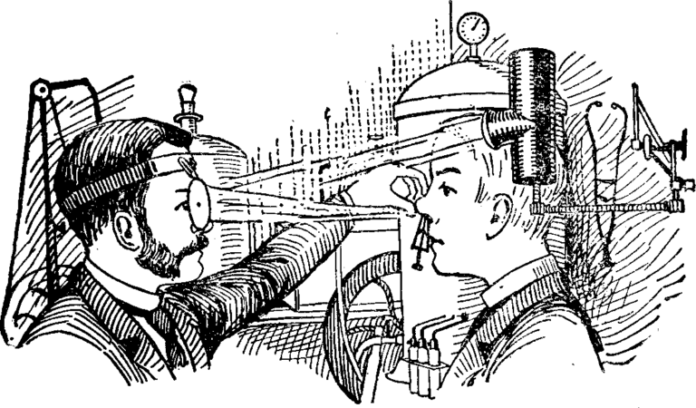[Warning: A bit o’ salty language ahead.]
I have always been a big believer in the idea of Karma and the role I have prayed to God countless times that it might play in paying back, and then some, the people beyond my reach to punish for crimes against me or those I love and care about. What never occurred to me, though, was how Karma could be a way in which people might be rewarded for a loving, selfless act, kindness, or generosity that they might have bestowed upon others. That was, at least, until I witnessed – and participated in – a moment in which Karma & My Doctor came face-to-face in an examining room.
For new readers that may not be aware, I should point out that I am blind in a little more than half of the right side of each eye and grapple with some really “interesting” cognitive deficiencies as a result of having had three strokes. I only mention it here to set the context for this story by pointing out that the doctor I am about to discuss is my Neurologist. I will leave his real name out of it in the name of privacy, but I think you might be interested to know that the first time we met, I was liquored up on Dilaudid, having a wonderful pajama party in my sexy Hospital Johnny, and just beginning to come to my senses after that third stroke event.
For the record, I am a life-long hater of doctors and hospitals. There has always been something different about this guy, though, and looking back on it now, I’d have to admit that some of our random encounters in life might not really be quite so random after all. My last stroke brought with it a whole new horde of doctors and nurses into my life, and it caused me to cross paths with this new Neurologist and, later, an Occupational therapist he referred me to, and these two people effectively changed my life forever. By the grace of God, the OT and I made such a connection that we remain in regular contact to this day. These two, in particular, forced me to ultimately put aside my preconceived notions about the medical industry and fully embrace the care they would give me despite myself.
When I was first discharged from the hospital, the medical community told my daughter I should not live alone unsupervised. As such, I had to move in with her and her family and contend with the steady stream of visiting Care Professionals such as nurses, physical therapists, occupational therapists, and that lady who had to check my blood levels because of the blood thinner medication I had been prescribed.
This complete invasion of every aspect of my life went on for several months before leaving me to set about the business of putting back together whatever remaining pieces of my life I had left. Having already been forced to quit my job and effectively retire, no longer able to read, write, drive, buy groceries, or tend to any of my personal affairs, I was – needless to say- not in the best of places inside my head. Two life-altering things that came out of this transition, from complete independence to total reliance on others, are worth mentioning: The first was that I was forced to make my bed every morning, and the visiting OT insisted that establishing daily routines was a necessary part of working my way back to some degree of renewed independence and that making your bed before you start your day would set in motion an ever-increasing sense of accomplishment, one task at a time.
The other thing she made me do, and, in hindsight, I assume she knew precisely what she was doing to me (although at the time, I thought she was being cruel), was to sit down next to me and make me log into my computer for the first time since the stroke. She asked me to tell her what I did for work and show her some examples. I complied, of course, generally irritated that I was about to have rubbed in my face all the things I used to do that I couldn’t do anymore. As I started the tour, struggling to see something or find things or even find the words to explain them to her, I began to notice that I was relying more on my memory of where things were rather than using my eyes to find them and, soon enough and without even realizing it, I started to understand the more significant point of this exercise; losing one of the five senses starts waking up the other four if you’re patient enough and persistent enough and it was at this moment that I began the journey back towards some sense of purpose in my new confounded life. I did well enough in those two or three sessions in front of the computer that I would go on to figure out how and “engineer” a way to, eight years later, write a book and publish it on Amazon.
Once discharged from home care, the next 18 months would be spent on follow-up visits, brain scans, blood tests, and every other test you can imagine. I eventually wound up back at Neurology to discuss where we would be going from here. After all those visits(6 bi-monthlies), the Neurologist and I had come down to our last visit before transitioning to annual follow-ups. That visit was a lot like graduation day minus the cap, gown, and tassel. I remember thinking he looked pretty proud of himself as he told me how proud he was of the progress I had made. And announced that – having been patched-up and all put back together- I had a good 20 or 30 years left in me to live out a good long life. Truth be told, I’d have to say the man was beaming.
I remember looking up at him, feeling a little frantic and distraught, and saying:
“What the fuck am I supposed to do with myself for the next 20 or 30 years in this condition? I can’t read or write, can’t work, can’t drive, and you guys won’t even let me live alone unsupervised.”
Without even a hint of hesitation, and coming from a man half my age, the response was both incredibly complex and terrifyingly simple all at the same time; he simply stated:
“Find something that gives meaning and purpose to your life.”
I remember wanting to argue and disagree and give the speech all over again about what I couldn’t ever do again or would struggle with for the rest of my life. I wanted to reject the advice and insist such wisdom might work for others but couldn’t possibly apply to me.
But I didn’t.
Instead, I kept my mouth shut even as my mind was racing at Mach speed, and we quietly did our long-established routine of exchanging fist-bump (germ avoidance and all that) and said our goodbyes.
As I made the 2-mile walk back home, I had plenty of time to navel-gaze and internalized and process our conversation while, at the same time, freaking the fuck out in my head about how this new life was going to work itself out; I began to realize that my fear, dread, and anxiety had very little to do with how I had gotten to this point and was almost entirely about whether I had it in me to make the most out of whatever life I had left to live.
A year later, when our appointment was due again, I was informed that he was not seeing patients but that he was still on staff. The more I asked, the less, they assured me, they could tell me beyond reiterating that he was still on staff and that I was welcome to make an appointment but with one of the other specialists. I reluctantly did and then blew it off when the appointment day came, telling them I was too sick and asking if I could reschedule. Half of the second year came and went, and my guy was still on staff and still not seeing patients. Now fully back in “I hate doctors” mode, but out of excuses to avoid setting up an appointment, I relented and let them schedule me for some new random doctor. The next available appointment wasn’t for three months out, so I happily cast it into the short-term memory bin, which has more holes in it than the Titanic, thanks to my medical history.
When the appointment reminder call with the new guy came… as fate would have it… the forecasted high temperature for that day was 18 below with the wind chill. Given that this is not the sort of weather a half-blind person should challenge on icy sidewalks, I rescheduled. Again. And I got a 90-day reprieve for my troubles because that was the next available opening with the new doctor.
When appointment day finally came, and I went through the check-in process that included filling out a questionnaire for the new doctor, I asked for assistance because of my visual issues, and someone happily took my answers and wrote them down for me. During that banter, I went on and on about my old doctor and how much I missed him, and how little anyone would tell me about what happened to him. I still got no answers and sat in a chair waiting for intake. The intake nurse was nice enough, the blood pressure was fantastic, and I continued babbling about my old doctor and how much I missed him, but I still got no leaks. She excused herself, telling me, “the doctor will be with you shortly,” and left me there for about 10 minutes with no other sound beyond the incessant ticking of one of those cheap clocks you see in examination rooms.
And I waited.
About the time that I had decided those clocks were designed to serve as some form of subliminal torture, along the lines of Poe’s ruminations on the matter of Tell Tale Hearts, a different nurse walked in and asked if I would like to see my original doctor instead of the one I was scheduled to see. I was gobsmacked. I said I couldn’t think of anything I would rather do, and before I could gush anymore, she was out the door again. And within a couple of minutes, there he was, standing in the doorway… grinning as if he had just found out what that evening’s winning lottery numbers were going to be.
He looked completely unchanged and displayed no outer signs of trauma or malady. We exchanged more grins, and then he spoke, and I was instantly in sensory overload. Something was terribly wrong with his speech, and it was initially quite difficult to understand his words.
I should point out here that one of my more interesting cognitive issues now, due to the strokes, is what has happened to my hearing. It has naturally improved as my eyesight has waned… but now, wherever I go, I literally hear everything. If I’m in a crowded restaurant, I can hear every voice from every table, and I can hear every word each of them says to the other despite the fact that I cannot see who is saying what to whom at which table. It’s almost like I have a “Spidey sense” about voices and sounds and frequencies but a complete loss of any sense of direction or origin. It’s kind of cool when you want to be nosy, but it’s horrifying when it comes over you like a wave yet is horribly distorted. My brain struggles to process it and translate it with any comprehensible clarity.
And so it was that, when he started talking, it sounded as if there was something wrong with his jaw, or his tongue, or maybe even his voice box or all of the above. My head was swimming, and I was struggling to make sense of it all while working overtime not to show any facial expressions or act as if anything was the least bit out of the ordinary. When he sat down, to his credit, the first thing he said was, “before we talk about what’s going on with you these days, let’s talk about the elephant in the room.” That set both of us at ease, I think, because I laughed, and then he laughed, and then he set about telling me everything that had happened… including some personal stuff about some of the ways his life had changed, both professionally and personally, since we had last seen each other roughly two years earlier.
He told me that, about six months after our last appointment together, he had suffered some type of bilateral coronary embolism event that ultimately led to his having had strokes on both sides of his body. They affected the left side a little more than the right and had caused his speech to become heavy and slurred, and he, like me, struggled with something they call “word-finding,”… a thing we stroke survivors often have to deal with… where we know what we want to say but can’t pull the word out of our brain and push it through our mouths. Once he had been released from the hospital, he, like me, started off with a bevy of Home Care providers that dealt with everything I had been through; OT, PT, the lady that checks your blood levels… All of it. He eventually moved on to these types of Therapies in an outpatient rehab facility, and, about six months after that his wife left him and took their two children with her.
He described his back and forth internal struggle about whether his lifelong dream of being a Neurologist was over and the roller coaster ride of emotions he endured as he tried to make sense of it all and sort through just what the hell he was going to do with himself. With his family destroyed and his future not looking terribly bright, he decided to put all his time, effort, and attention into his physical therapy so that he could at least regain as much mobility and physical independence as possible. And, as if to cut himself short as he began to realize he had probably said too much to a patient about his own personal struggles, he ended by telling me that, even though he hadn’t officially started seeing patients again, when he heard I was prattling on about missing him so much, he decided to come in and see me anyway.
And then we sat in silence for a minute or two, each of us trying to take it all in.
What kept playing over and over in my mind was the very advice he had once given me… at our last appointment two years earlier. And it came out of me before I even realized I was thinking about saying it out loud. I looked at him and told him how proud of him I was and how deeply I admired and respected his determination to stand up, dust himself off, and get back in the saddle after everything he had lost and everything he had been through. And I told him that I was as sure as I could be that it was Karma that had kept me away from his office all that time… waiting until he was ready to come back to work and continue my care and take back the meaning and purpose in his own life that he had chosen to pursue all those years ago when he chose to enter med school.
I want to believe that I reintroduced him to the Karma he had passed on to me and that I was able to remind him of the courage he had so freely given away to me that I was so happily and humbly willing to return to him in kind. I also want to believe that he was reminded of all the reasons he never gave up. And, for what it’s worth, he reminded me at the same time that all any of us can do in this life is either lay down and die or fight every day to make the most out of whatever hand we are dealt.






